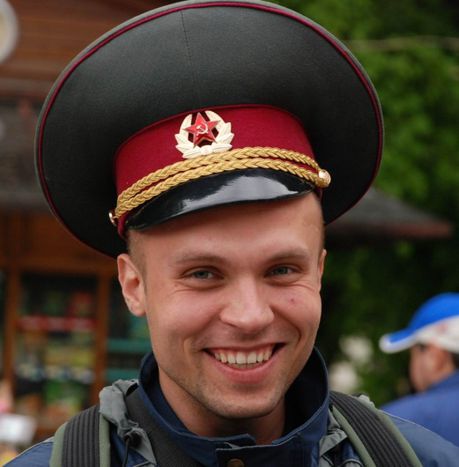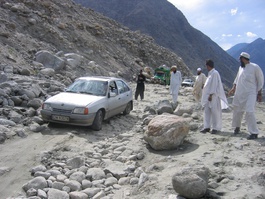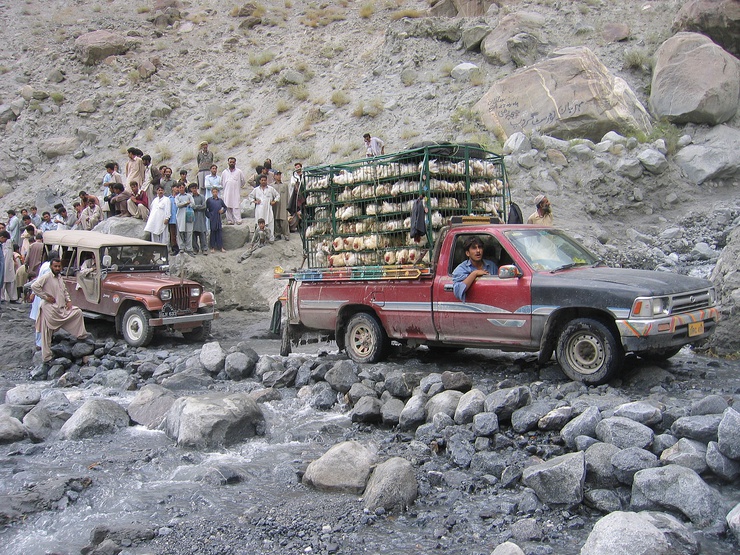
Grzegorz Szczygieł, Panjabi MC and an Opel Kadett
Published on
Translation by:
Paulina DominikThe director garnered acclaim from a travel festival in Wroclaw in 2008 for a documentary which took him from being a Polish businessman in Wroclaw to a traveller in Pakistan and Iran, parts of which he covered with the famed postwar car
Grzegorz - pronounced 'Gresiek' in Polish - is an economist by trade who also manages his own company promoting electronic bikes in Wrocław, It's not just about having your own business, he explains - it's about encouraging people to protect the environment and lead a more ecological lifestyle. Grzegorz is an optimist who wasn't content with only dreaming of the orient. He initially started travelling with his business, before it became a lifelong passion. His first trip was across the Karakoram Highway, the highest asphalt route between China and Pakistan. The trip resulted in Car on the Roof of the World ('Autem na dach świata'), a documentary of his time in an old Opel Kadett vehicle, which picked up an award at a travel festival in Wroclaw in 2008. In 2009 he was nominated once more for his Iranian-inspired travel book 125 is enough, or 40, 000 kilometres in a Fiat 25p ('Duży może więcej czyli 40 000km dużym fiatem').
European prejudices about Iran
 It's been hours since we started our discussion, but Grzegorz remains just as animated - as he talks, I perceive a constant lack of satiety. His memories often return to people that he has met during his escapades. He talks about dealing with the foreign and unknown where naturally two worlds emerge – ours and theirs. Encounters with foreigners trigger diverse emotions, and anxiety most frequently. The confrontation with foreign civilisation clarifies the cultural differences that characterise individuals. Is it enough to get rid of stereotypes, I ask; Grzegorz brings up his time in Iran, which he says gave him a chance to fully understand the impact of the media-spun prejudices. For most Europeans, Iran is merely a country of hostility and bomb production. But in reality it is a really friendly place. When I got to the border I was greeted with a Welcome to Iran! Immediately someone brings a cup of hot tea,' he says, moved.
It's been hours since we started our discussion, but Grzegorz remains just as animated - as he talks, I perceive a constant lack of satiety. His memories often return to people that he has met during his escapades. He talks about dealing with the foreign and unknown where naturally two worlds emerge – ours and theirs. Encounters with foreigners trigger diverse emotions, and anxiety most frequently. The confrontation with foreign civilisation clarifies the cultural differences that characterise individuals. Is it enough to get rid of stereotypes, I ask; Grzegorz brings up his time in Iran, which he says gave him a chance to fully understand the impact of the media-spun prejudices. For most Europeans, Iran is merely a country of hostility and bomb production. But in reality it is a really friendly place. When I got to the border I was greeted with a Welcome to Iran! Immediately someone brings a cup of hot tea,' he says, moved.
I have the impression that I have the same stereotypes about Iran and I find it hard to accept his words. Is it possible that Iranians are a friendly nation, happy to see foreign tourists in their country? Grzegorz helps me to rid myself of my doubts and my attempts to grumble without cause. 'Newcomers are treated with special honours. Iranians feel obliged to invite you to their homes and talk to you,' he says and looks at me steathily to check whether I believe him. 'I asked one of the waiters why they are behaving that way and he replied shortly: Because you are our guest.' He recalls another story from Esfahan, an Iranian cultural cradle of a town located about 340 km away from Tehran, the capital. 'I was on the town square where locals organise evening picnics. They usually invite you to have a cup of tea with them or offer you some cheese. A group of people approached me with an Iranian student, who acted as interpreter - there were at least thirty people there, all curious to know things! Incredible. Another time, when our car broke down, a random man offered to give us a lift to a nearest town and buy what was needed to repair it; the distance was 400 km! Can you imagine that after an all-day trip I found no way to convince him to accept any payment?' We both fall silent.
Women in Iran
I wonder. How would I manage in the islamic world not only as a foreigner, but as a female tourist? 'In small Pakistani towns you cannot see any women in the streets. They are busy with their households, farms and animals. Buses and beaches are divided into male and female sections. Big and tall screens separate them from men. They swim fully dressed. For Pakistanis it is a tradition.' The debate concerning the place and role of women in Pakistan will not end soon. However, we can see that their visibility is growing. 'Although women wear headscarves in Iran, their presence in the public sphere of life is not shocking. Young Iranian women are not very different from Europeans. They like wearing make-up, fashionable clothes and jewellery. They have their own plans, go to university and develop their interests.'
Nonetheless, cultural differences stemming from dissimilar historic experiences do not make dialogue easier. Hospitality is incredibly important but in the Iranian version it is astounding. But is it enough to be able to live next to each other? 'We are divided not only by language, or national and cultural identities. In Pakistan the individual is not important. When we were going through mountains, the level of water in a river had significantly increased and it turned out impossible to get to its opposite bank. A digger was making a special embankment to make it possible. Cars were waiting in a long queue. In one of the cars brakes stopped working and it ran into a group of onlookers dragging three people into water. Two men were rescued. The third one was probably dead. They threw him into a lorry as if he were a bag. In a van buried by stones I saw another victims. Pakistanis were taught such an austere attitude towards life by turbulent history of their country – never-ending conflicts, riots and military coups.'

Language is a barrier, that's for sure. Yet more frequently, the kaleidoscope of different ideas, faiths and habits is trying to become a harmonious and coherent entity. 'We want to live together,' says Grzegorz. 'However, I know that what still awaits us is hard work. In order to make our co-existence more efficient we should make use of experiences gathered by multicultural countries. We will reach an agreement if newcomers start working without benefiting from social privileges. They have to assimilate, learn local languages, respect culture and laws in force. We have to respect each other and come to understand that conflicts are a typical element in encounters between foreigners. No matter how much effort we make, we will be always divided into us and them.'
Images: ©Grzegorz Szczygieł
Translated from Grzegorz Szczygieł: „Mimo wysiłków zawsze będziemy my i oni”.



